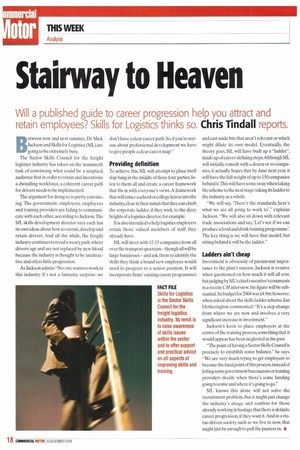Stairway to Heaven
Page 18

If you've noticed an error in this article please click here to report it so we can fix it.
Will a published guide to career progression help you attract and retain employees? Skills for Logistics thinks so. Chris Tindall reports.
Between now and next summer, Dr Mick Jackson and Skills for Logistics (SfL) are going to be extremely busy. The Sector Skills Council for the freight logistics industry has taken on the mammoth task of convincing what could be a sceptical audience that in order to retain and incentivise a dwindling workforce, a coherent career path for drivers needs to be implemented.
The argument for doing so is pretty convincing. The government, employers, employees and training providers are failing to oommunicate with each other, according to Jackson. The SfL skills development director says each has its own ideas about how to recruit, develop and retain drivers. And all the while, the freight industry continues to tread a weary path ,where drivers age and are not replaced by new blood because the industry is thought to be unattractive and offers little progression.
As Jackson admits:"No-one wants to work in this industry. It's not a fantastic surprise; we don't have a clear career path. So,if you're serious about professional development we have to give people a clear career map."
Providing definition
To achieve this. SIL will attempt to place itself slap bang in the middle of these four parties, listen to them all and create a career framework that fits in with everyone's views. A framework that will entice a school or college leaver into the industry, clear in their minds that they can climb the corporate ladder, if they wish, to the dizzy heights of a logistics director,for example.
It is also intended to help logistics employers retain those valued members of staff they already have.
SfL will meet with 12-15 companies from all over the transport spectrum— though all will be large businesses — and ask them to identify the skills they think a brand new employee would need to progress to a senior position. It will incorporate firms' existing career programmes and cast aside bits that aren't relevant or which might dilute its own model. Eventually, the theory goes, SfL will have built up a "ladder", made up of career-defining steps.Although SfL will initially consult with a dozen or so companies, it actually hopes that by June next year it will have the full weight of up to 150 companies behind it.This will have some sway when taking the scheme to the next stage:taking its ladder to the industry as a whole.
"We will say, 'There's the standards, here's what we are all going to work to'," explains Jackson. "We will also sit down with relevant trade associations and say, 'Let's see if we can produce a food and drink training programme'. The key thing is we will have that model, but sitting behind it will be the ladder."
Ladders ain't cheap
Investment is obviously of paramount importance to the plan's success. Jackson is evasive when questioned on how much it will all cost, but judging by SIL's chief executive's comments in a recent CM interview, the figure will be substantial. Its budget for 2004 was £4.9m ;however, when asked about the skills ladder scheme, Ian Hetherington commented: "It's a step change from where we are now and involves a very significant increase in investment."
Jackson's keen to place employers at the centre of the training process, something that it would appear has been neglected in the past.
"The point of having a Sector Skills Council is precisely to establish some balance," he says. "We are very much trying to get employers to become the focal point of this process, instead of letting some government bureaucrats or training providers decide when there's some funding going to come and where it's going to go," ML knows this alone will not solve the recruitment problem, but it might just change the industry's image and confirm for those already working in haulage that there is definite career progression, if they want it. An d in a status-driven society such as we live in now, that might just be enough to pull the punters in. •


























































































































































































